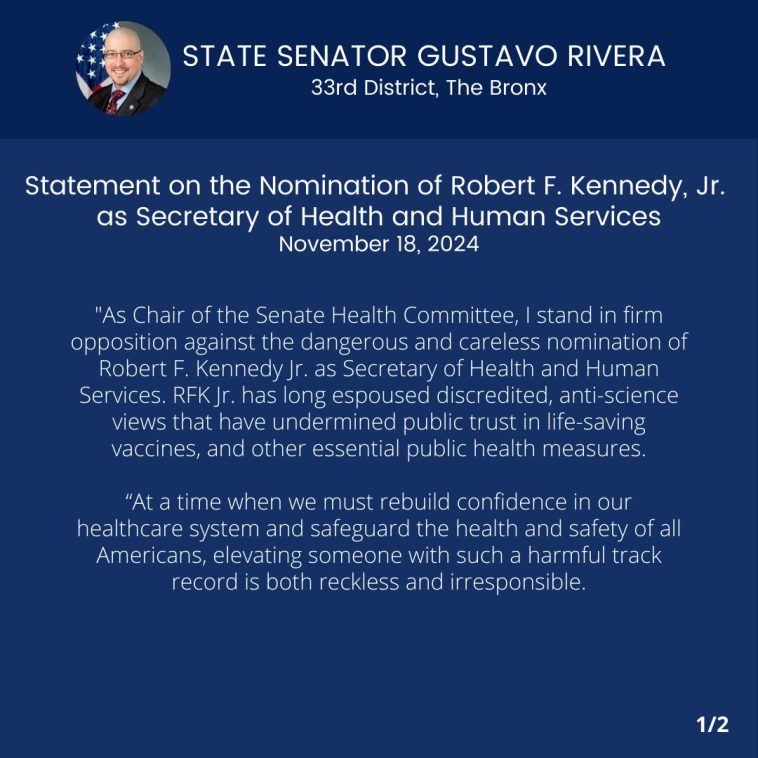A group of 77 esteemed scholars, all Nobel laureates, have expressed their opposition to the United States Senate regarding the proposed appointment of Robert F. Kennedy Jr. to head the principal health agency in the nation. They cite Kennedy’s documented stance against conventional health measures such as vaccinations and the addition of fluoride to drinking water as reasons for their apprehension.
Their collective letter argues that Kennedy’s nomination to the position at the Department of Health and Human Services would place the nation’s public health in a precarious position. The department’s responsibilities encompass a vast scope, including the oversight of food and drug safety, prevention and control of disease outbreaks, and regulation of health insurance.
Part of their concern stems from Kennedy’s outspoken resistance to vaccines for common diseases such as measles, mumps, rubella, and polio. They point out that Kennedy’s unwarranted fear of these vaccines is at odds with the overwhelming scientific consensus and public health policy.
A significant component of their argument against Kennedy’s nomination is his endorsement of the unfounded belief that childhood vaccinations cause autism. This view has been thoroughly debunked by reputable scientific research and the wider medical community.
Kennedy is the founder of the anti-vaccination organization Children’s Health Defense. This group has undertaken numerous legal actions against governments with the aim of resisting mandatory vaccine requirements. They have even contributed to the production of a follow-up to the dubious film ‘Vaxxed’ created by Andrew Wakefield, known for promoting vaccine misinformation.
Kennedy has publicly espoused his belief that vaccines are responsible for autism, despite the lack of any scientific evidence to support his claim. In one incident, he was even documented on video alleging that the COVID-19 virus specifically targets Caucasians and black individuals, while Ashkenazi Jews and Chinese populations are largely immune.
Organizations such as the Anti Defamation League and the Stop Asian Hate Project denounced these unjustified remarks swiftly. The assertion that vaccines can cause autism has long been debunked. It initially emerged from a discredited research paper written by British scientist Andrew Wakefield.
Wakefield’s claim was eventually retracted and his article was named an ‘elaborate fraud’. His data was exposed as false, and it was revealed that parents of the child participants in his study were pursuing legal action against vaccine manufacturers. Therefore, any residual belief in a link between vaccines and autism lacks credibility.
It is essential to note that studies have demonstrated that refusing to vaccinate has no impact on decreasing a child’s chance of being diagnosed with autism. However, this decision dramatically raises the risk of a child contracting a disease that could have been prevented with a vaccine or, in a worst-case scenario, dying from the disease.
In response to the criticisms, representatives from former President Donald Trump’s administration defended the decision to nominate Kennedy, indicating that they believe the citizens of America are tired of elite governance and yearn for change in their healthcare system.
The representatives asserted Kennedy would implement the former President’s vision for restoring the country’s healthcare integrity, seemingly brushing off the concerns raised about Kennedy’s controversial stances on vaccines and other public health matters.
The Nobel laureates’ letter further criticizes Kennedy as a fierce adversary of well-established agencies such as the Food and Drug Administration, the National Institutes of Health, and the Centers for Disease Control. They advocate for a leader who would take the forward path of nurturing and enhancing these crucial institutions, rather than posing threats to their existence.
The laureates signing this letter represent a wide range of academic disciplines, with distinctions in fields such as medicine, physics, chemistry, and economics. Their collective work and contributions to their respective fields lend significant weight to their opinion on this matter.
Notable signatories include those whose pioneering work led to the creation of the mRNA COVID-19 vaccine, which has been instrumental in the ongoing fight against the global pandemic. Also among the signatories are those responsible for the discovery of the Hepatitis C virus.
Their collective vociferous objection to Kennedy’s nomination underpins the wider commitment of the scientific community to uphold fact-based public health policies and resist viewpoints and decisions that are unsupported by robust scientific evidence.


